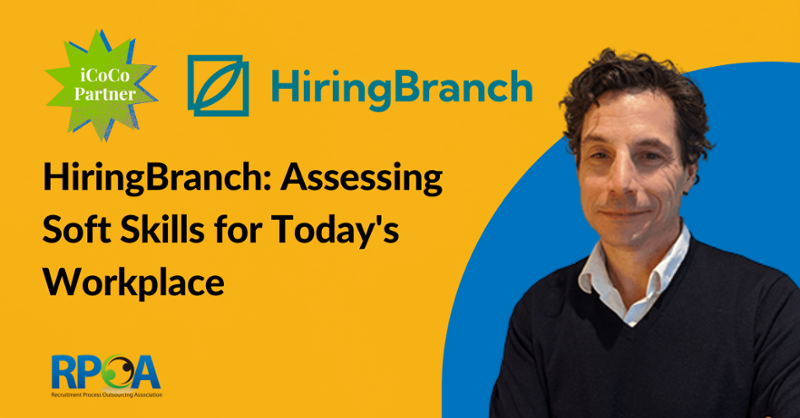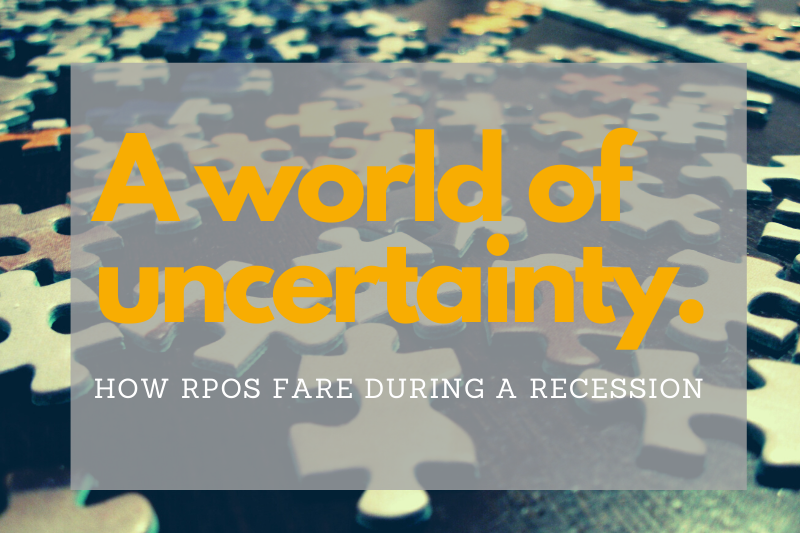
Recruitment Process Outsourcing (RPO) is invaluable to employers amidst the disruption in the talent market. Hiring talent these past two years has been challenging and difficult for employers and their RPO partners. The act of hiring talent became a giant game of "Where's Waldo." However, through all the chaos and frustration, employers have come to value their relationship with their RPO provider.
This year's third annual RPOA Conference in Chicago highlighted the value RPO providers bring to their employer partners. Ben Eubanks, Chief Research Officer at Lighthouse Research & Advisory, kicked off the conference with an insightful keynote presentation highlighting some informative results from the upcoming 2022 RPO Value Study, underwritten by the RPOA.
The study's goal was to highlight the value RPOs give to employers. The study explores the value employers get from RPO, the employers' priorities in the RPO relationship, what factors they consider when choosing an RPO partner, and what factors they look at when considering changing RPO providers.
In his presentation, Eubanks discussed the current situation, how employers value the RPO relationship, employers' expectations from that relationship, and where their expectations are being met and not being met. This blog post is a recap of that presentation.
The Current Hiring Environment
Eubanks pointed out that it's a strange time when you see news headlines showing employers laying off people and, on the same day, other employers need workers, but they can’t find enough talent. We are left wondering, “where are all the people? Where did they go?” He reflected that this was the first time he saw these two dynamics happening simultaneously during his time as a recruiter and researcher.
According to the 2022 Talent Acquisition Trend Report, 33 percent of candidates surveyed said that after accepting an offer from a company, they're committed to that company. However, his research found that 67 percent of candidates interviewed said, 'they're going to keep their options open anywhere from a few weeks until “whenever I feel like it. I'm always going to be open to another offer.”'
Ghosting
Eubanks shared that the challenge of candidate ghosting is going through the roof.
Eubanks noted that the data shows a correlation between age and ghosting. "Someone who is 25 is more likely to ghost than someone who is 35. And someone who is 35 is more likely to ghost than someone who's 45, and so on," he said. "The data shows that people who are 55 years old and older in the workplace are the least likely to ghost an employer."
He concluded that ghosting would worsen over time because workers 55 years old and older are steadily aging out of the workforce. He emphasized that ghosting is not a fad that will disappear, and data reveals that ghosting will not stop anytime soon.
Employees Planning to Quit
Another challenge employers are seeing is a high turnover rate. Eubanks shared that recent data from August shows 1 in 4 employees are planning to quit their jobs in the next six months. "So there's still going to be this turnover," he said. "There's still going to be this opportunity. If you want to look at it that way, there's still going to be this turnover, this shift, this disruption at least for the foreseeable future."
How Employers Value RPO relationships
An upcoming 2022 RPO Value Insights study, underwritten by the RPOA, looked into how employers value RPO relationships across five factors:
-
Improved hiring metrics
-
Increased focus on more important business matters
-
Scaling up and down of hiring
-
Return on investment (ROI)
-
Cost
The study asked, "Does having an RPO actually influence and change the hiring metrics you're actually able to achieve?" 97 percent of the employers asked that question said, "[RPO] helps to improve those metrics."
Increased Focus on More Important Business Matters
The study revealed that “nine out of ten companies say that having this relationship with the right RPO allows them to focus on other things that matter.” He pointed out that he sees similar results in research across HRO and BPO and that he expects this kind of consistency. He emphasized that having nine out of ten employers essentially agree on this finding is amazing. It's incredible statistically speaking because he pointed out that “if ten people agreed to go to lunch, nine out of ten wouldn't agree on where to go for lunch.” So to "have nine out of ten employers in the open market say that they believe a relationship with the right RPO helps them focus on their more important business matters is a compelling statement--is a testament to the value [RPO] brings to them," he said.
Scaling Hiring Up and Down
The ability of an employer to scale up and down their hiring is a big deal. Eubanks shared that HR and TA leaders tell him, 'the boss is asking me what it costs us not to have a person ready to take this job and we've never had to look at that before. We've always assumed that the people are going to be there. They're going to be readily available.' Research shows that HR and TA leaders suddenly need to change their approach to hiring. He noted that employers have always assumed that there will be someone in the pipeline to grab the next available job. And now, they're not there, which has created a disruption and challenge for business leaders outside the talent function.
The 2022 RPO Value Insight Study shows that RPO helps employers see more clearly where their hiring priority is, and if the employer can get only one person for the job, where's the best place to put that one person?
Return on Investment (ROI)
Eubanks shared more than half of the employers interviewed said they had a positive return on investment (ROI) from their RPO. He explained that this data is fluid. This percentage, he said, "is affected by the length of that relationship. The longer someone has that RPO relationship in place, the more likely they are to say that the ROI has been a positive one."
He noted that veterans of RPO know that it takes time to understand everything a specific company is about, how they work, their values, and the kind of things they care about when selecting candidates. He emphasized, "It's hard to get all those things in the first month, when you start a new engagement with them, you need to take some time to build up that relationship and understand those things and get what they're about to build along with that."
When Eubanks looked at those RPO users with a positive ROI, he found that they were 725 percent more likely to receive support for hiring strategy and business alignment. He pointed out that the only way to have a negative ROI using RPO is if the company only asks to fill roles--put people in seats.
And that kind of transactional relationship, Eubanks added, leads companies to focus mainly on the time-to-fill metric. The study showed that companies prioritizing getting people in the seats using an RPO have a negative ROI.
Cost
Regarding the cost of choosing an RPO partner, the study shows that cost is only a big deal for employers not using RPO yet. He said that cost is a barrier for those who have yet to partner with an RPO. But for employers who have used RPO or are partnered with RPO, the cost is not a big deal. And of the employers thinking of changing RPO partners, "15 percent of respondents indicated that cost is a factor," he said.
What Employers Want From RPO Partnerships
Eubanks shared a story analogous to what employers want from RPO partnerships. The story is about some folks picnicking along a river, and one person notices a child floating down the river. He jumps into the river and saves the child. After a while, another child floats by in the river, and that person jumps into the river to rescue the child. This continues until another person finally announces that he's going upstream to find the jerk throwing the kids into the river.
Eubanks observed that employers are looking for someone to help them think upstream. He shared that employers want an RPO partner that helps them think, not just about the problem. He noted that they know the problem--they can't find people. They know the problem already. "They want someone that helps them think farther upstream about how can we solve this in a more business aligned way? How can we solve this in a more innovative way? How can we tackle this problem that we're facing in a way we haven't already thought of," he said. "That's why they've arrived at the table to have a conversation with [an RPO], if they could think of it if they could, if they could do it themselves, they wouldn't need any of the support that [an RPO] provides."
When the study looked at the reasons employers partnered with an RPO, the factors include in order of importance:
-
Technology and automation
-
Analytics and strategic insights
-
Speed of implementation
-
Quality of Support
-
Cultural alignment with business
Eubanks stated that the maturity of that relationship and how long they've been working with an RPO affect what employers look for in an RPO partnership. He observed that employers in an RPO relationship for less than two years look at tactical things. He said that they want help with internal hiring, diversity recruiting, and employer branding.
He added that employers with an RPO relationship for more than four years are twice as likely to focus on business alignment. So from a business alignment standpoint, he reminded RPOs to ask, are we:
-
Helping employers understand how all these things they're doing from a hiring standpoint align with their business needs?
-
Solving the problems of the business or just filling another job or closing another req?
-
Seeing the relationship's outcomes and understanding how it fits into the bigger problem the business is trying to solve?
The takeaway for Eubanks is that there is short-term value in working with an RPO. But he added that RPOs should work towards this longer-term specific alignment with the overall hiring strategy of the business. "If it's only limited to those specific and tactical things. You're never gonna be able to get to the other stuff that actually matters," he said.
RPO Services Offered vs. RPO Services Preferred
The study asked employers currently using RPO, "What are you getting from your provider? What do you want? What do you prefer? What are you hoping to get?" He said that cultural alignment with business and benchmarking are two things employers prefer from an RPO but are not getting. He pointed out that companies desire RPOs to help them to understand how they stack up against other companies like them in their industry, that is, their size. He observed that these companies have similar types of hiring challenges or types of hiring roles. These companies want to know whether their pay scale is similar to other companies. They want to know whether another company is offering a benefit that's killing them in every offer because they don't have that specific benefit in their mix. He pointed out that this could be an action item for RPOs to consider; find out if the companies they're working with want those things.
Eubanks said that the study showed that about one in three companies in a partnership with an RPO is considering changing providers in the next year. The number one reason these companies gave for looking for another provider was a misalignment in the values or the culture of the RPO and their company.
Cultural alignment is important from a provider’s perspective. Eubanks shared a conversation he had with a friend who is an RPO provider. This provider said that sometimes RPO deals die on the vine, or they get a deal up and running and then realize that the prospective company is looking for a transactional relationship. And that's not how RPO works. He pointed out that RPOs might want to ask questions of potential hiring partners that show them the companies looking for a strategic relationship and those looking for a transactional relationship.
His last point on cultural alignment was that companies with a positive ROI from their RPO relationship are three times more likely to prioritize cultural alignment than companies with a negative ROI from their RPO relationship.
Eubanks concluded his presentation by reminding the audience to expect the unexpected. Amid the turmoil of these past two years, it's hard to see what's around the bend. A key point the 2022 RPO Value Insights Study underscores is that despite the turmoil and uncertainty of the times, RPO brings measurable and meaningful value to employers---and they see it.













